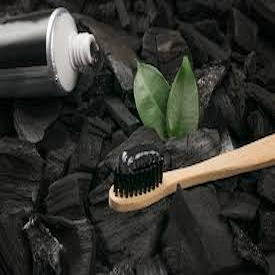The Charcoal Toothpaste, How Does it Whiten Teeth

Charcoal Toothpaste
The Charcoal Toothpaste
Typically, toothpaste doesn’t make news. But in recent years, you’ve probably heard a lot about charcoal toothpaste—the black paste that claims to whiten teeth. What’s the true story behind the hype, though?
Let’s start by being clear that the charcoal in toothpaste is not the same as the charcoal in a pack of barbecue briquettes or an artist’s toolbox. Activated charcoal is the kind found in toothpaste.
Why Use Charcoal in Toothpaste making?
Similar to ordinary charcoal, activated charcoal can be made from coal, peat, coconut shells, wood, or petroleum. The main distinction, though, is that throughout the manufacturing process, activated charcoal is subjected to a unique gas that causes it to form enormous pores. The charcoal can absorb a wide range of chemicals because of its pores, which increase its absorbency.
And that’s how charcoal and teeth are related. Surface stains are among the problems it may help with.
READ ALSO: Energy Drinks; How Bad They Are To Your Health
Is it new?
There is a long history of using charcoal to clean teeth. The ancient Romans used a variety of brush materials, including tree bark and charcoal. A toothpaste recipe from an English homemaker’s guide from the 19th century also calls for charcoal! However, is charcoal toothpaste effective?
Does Charcoal Whiten teeth?
Whitening and surface stain removal are two different things. Extrinsic stains, also referred to as surface stains, can originate from a variety of substances, including tobacco, red wine, coffee, and dark meals and beverages. They reside on the layer of enamel and are frequently eliminated by using toothpaste or surface whitening procedures.
The sort of whitening procedure that works best for you may depend on the type of tooth discoloration you have. Some people may find that all they need to lighten their teeth and remove surface stains is whitening toothpaste.
This implies that while toothpaste containing activated charcoal and other substances might definitely get rid of the signs of your cold brew habit, it probably won’t be as effective as a professional whitening procedure.
READ ALSO: COLGATE CHARCOAL
Use or Drop
Although charcoal toothpaste may have numerous advantages, not all types contain fluoride, so if you’re susceptible to tooth decay, be mindful of this. If you want to use it without fluoride, your dentist could suggest a fluoride rinse to help build your enamel because most dentists encourage their patients to utilize fluoride in some way.
Don’t be concerned about the texture if you’re thinking about using it. It could contain charcoal, but the charcoal that is mixed into the paste is probably more equivalent to the soft consistency of baking soda. Like other whitening toothpastes, many charcoal toothpastes also include flavorings.



